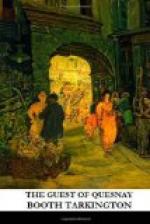It does not whiten my guilt that the shaft did not reach him.
“I’ve told her all I know,” he said readily, and the unconscious pathos of the answer smote me. “And all that Keredec has let me know. You see I haven’t—”
“But do you think,” I interrupted quickly, anxious, in my remorse, to divert him from that channel, “do you think Professor Keredec would approve, if he knew?”
“I think he would,” he responded slowly, pausing in his walk again. “I have a feeling that perhaps he does know, and yet I have been afraid to tell him, afraid he might try to stop me—keep me from going to wait for her. But he has a strange way of knowing things; I think he knows everything in the world! I have felt to-night that he knows this, and— it’s very strange, but I—well, what was it that made him so glad?”
“The light is still burning in his room,” I said quietly.
“You mean that I ought to tell him?” His voice rose a little.
“He’s done a good deal for you, hasn’t he?” I suggested. “And even if he does know he might like to hear it from you.”
“You’re right; I’ll tell him to-night.” This came with sudden decision, but with less than marked what followed. “But he can’t stop me, now. No one on earth shall do that, except Madame d’Armand herself. No one!”
“I won’t quarrel with that,” I said drily, throwing away my cigar, which had gone out long before.
He hesitated, and then I saw his hand groping toward me in the darkness, and, rising, I gave him mine.
“Good night,” he said, and shook my hand as the first sputterings of the coming rain began to patter on the roof of the pavilion. “I’m glad to tell him; I’m glad to have told you. Ah, but isn’t this,” he cried, “a happy world!”
Turning, he ran to the gallery steps. “At last I’m glad,” he called back over his shoulder, “I’m glad that I was born—”
A gust of wind blew furiously into the courtyard at that instant, and I heard his voice indistinctly, but I thought—though I might have been mistaken—that I caught a final word, and that it was “again.”
CHAPTER XV
The rain of two nights and two days had freshened the woods, deepening the green of the tree-trunks and washing the dust from the leaves, and now, under the splendid sun of the third morning, we sat painting in a sylvan aisle that was like a hall of Aladdin’s palace, the filigreed arches of foliage above us glittering with pendulous rain-drops. But Arabian Nights’ palaces are not to my fancy for painting; the air, rinsed of its colour, was too sparklingly clean; the interstices of sky and the roughly framed distances I prized, were brought too close. It was one of those days when Nature throws herself straight in your face and you are at a loss to know whether she has kissed you or slapped you, though you are conscious of the tingle;—a day, in brief, more for laughing than for painting, and the truth is that I suited its mood only too well, and laughed more than I painted, though I sat with my easel before me and a picture ready upon my palette to be painted.




